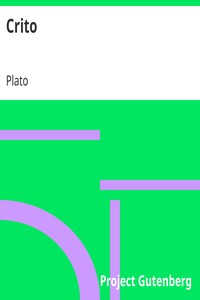Crito by Plato
"Crito" by Plato is a philosophical dialogue written during the late 4th century BC. The book features a conversation between Socrates and his friend Crito, primarily discussing themes of justice, duty, and the social contract. It serves as a critique of Socrates' decision to accept his death sentence rather than escape from prison, prompting reflections on personal ethics vs. societal laws. In this dialogue set in Socrates' prison cell, Crito visits Socrates
with a plan for his escape, urging him to flee and avoid execution. Crito argues from emotional and social perspectives, worrying about the disgrace that will fall upon him if he does not help Socrates. However, Socrates counters with philosophical reasoning, emphasizing that one should never do wrong, even in response to wrongdoing. He explores the nature of justice, the obligation to the laws of the state, and the consequences of escaping prison. Ultimately, Socrates concludes that it is unjust to flee, as doing so would undermine the principles he has long upheld. This dialogue highlights the conflict between individual morality and the laws of society, illustrating Socrates' commitment to his ideals even in the face of death. (This is an automatically generated summary.)
Read now or download (free!)
| Choose how to read this book | Url | Size | ||||
|---|---|---|---|---|---|---|
| Read online (web) | https://sendtokindle.compellingsciencefiction.com/ebooks/51220.html.images | 57 kB | ||||
| EPUB3 (E-readers incl. Send-to-Kindle) | https://sendtokindle.compellingsciencefiction.com/ebooks/51220.epub3.images | 71 kB |
Send
to kindle email: |
|||
| EPUB (no images, older E-readers) | https://sendtokindle.compellingsciencefiction.com/ebooks/51220.epub.noimages | 69 kB | ||||
| Kindle | https://sendtokindle.compellingsciencefiction.com/ebooks/51220.kf8.images | 123 kB | ||||
| older Kindles | https://sendtokindle.compellingsciencefiction.com/ebooks/51220.kindle.images | 115 kB | ||||
| Plain Text UTF-8 | https://sendtokindle.compellingsciencefiction.com/ebooks/51220.txt.utf-8 | 49 kB | ||||
| Download HTML (zip) | https://www.gutenberg.org/cache/epub/51220/pg51220-h.zip | 67 kB | ||||
| There may be more files related to this item. | ||||||
Similar Books
About this eBook
| Author | Plato, 428? BCE-348? BCE |
|---|---|
| Translator | Ficino, Marsilio, 1433-1499 |
| Title | Crito |
| Note | Wikipedia page about this book: https: //en.wikipedia.org/wiki/Crito |
| Note | Reading ease score: 46.5 (College-level). Difficult to read. |
| Credits | Produced by Carolus Raeticus |
| Language | Latin |
| LoC Class | B: Philosophy, Psychology, Religion |
| LoC Class | PA: Language and Literatures: Classical Languages and Literature |
| Subject | Classical literature |
| Subject | Philosophy, Ancient |
| Subject | Justice -- Early works to 1800 |
| Subject | Dialogues, Greek -- Translations into Latin |
| Category | Text |
| EBook-No. | 51220 |
| Release Date | Feb 14, 2016 |
| Copyright Status | Public domain in the USA. |
| Downloads | 140 downloads in the last 30 days. |
| Project Gutenberg eBooks are always free! | |

